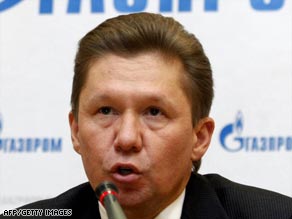Gazprom: Russia's most powerful company
posted on
Jan 06, 2009 08:26AM

Developing large acreage positions of unconventional and conventional oil and gas resources

http://www.cnn.com/2009/WORLD/europe...
(CNN) -- Gazprom is the world's biggest producer and exporter of natural gas -- and Russia's most powerful company.

Gazprom's current chief executive, Alexey Miller.
It controls 20 percent of the world's natural gas reserves and operates the world's largest gas distribution network -- approximately 157,000 kilometers of pipelines covering an area from Europe to the Far East, according to its Web site.
Gazprom exports energy to 32 countries and provides around 25 percent of the European Union's gas supplies.
Last month it reported an 85 percent increase in net profits to $20.8 billion for the first six months of 2008. In 2007 it reported annual profits totaling nearly $61 billion. In 2008 the Financial Times placed it fourth on its list of the world's top 500 corporations, as ranked by market capitalization.
Formed in 1989 to replace the Soviet Ministry of the Gas Industry, Gazprom is closely tied to the Russian government, which owns a controlling 50 percent stake in the company. Current Russian President Dmitry Medvedev is a former Gazprom chairman.
In recent years, an increasingly confident Moscow has used Gazprom to assert its authority over Russia's former sphere of influence by offering heavily subsidized gas to ex-Soviet countries such as Ukraine and Belarus.
But that policy has led to disputes as Gazprom has then sought to raise prices.
Gazprom last week switched off gas supplies to Ukraine for the second time in two years in a row over payments and Kiev's rejection of a proposal which would have increased the cost of gas to $250 per 1,000 cubic meter. Instead Gazprom said Ukraine would have to pay the full market rate of $418 dollars per 1,000 cubic meter.
Other countries including Austria, Bulgaria, the Czech Republic, Germany, Romania, Greece and Turkey have complained that their gas supplies have also been affected at the height of demand as winter temperatures dip well below freezing in many places.